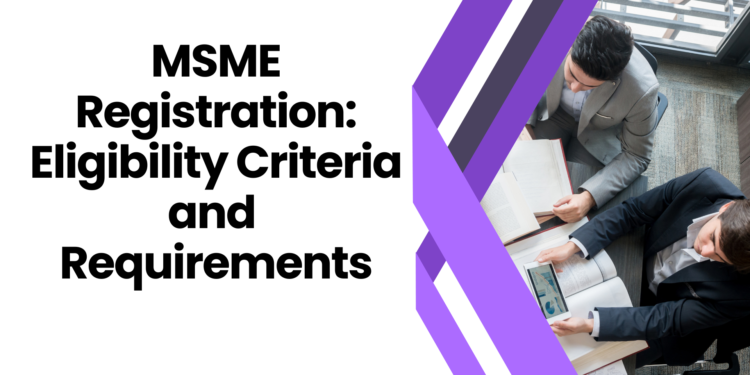Introduction:
Micro, Small, and Medium Enterprises (MSMEs) play a significant role in the growth and development of economies worldwide. To support and empower these enterprises, many countries, including India, have implemented MSME registration processes. By obtaining MSME registration, businesses can avail themselves of various benefits, such as access to credit, government subsidies, and priority in government tenders. In this article, we will explore the eligibility criteria and requirements for MSME registration in India.
Eligibility Criteria:
To be eligible for MSME registration, businesses must meet certain criteria based on their investment and annual turnover. The classification of enterprises is as follows:
Micro Enterprises:
- Manufacturing Sector: Investment in plant and machinery does not exceed INR 25 lakhs.
- Service Sector: Investment in equipment does not exceed INR 10 lakhs.
Small Enterprises:
- Manufacturing Sector: Investment in plant and machinery is more than INR 25 lakhs but does not exceed INR 5 crores.
- Service Sector: Investment in equipment is more than INR 10 lakhs but does not exceed INR 2 crores.
Medium Enterprises:
- Manufacturing Sector: Investment in plant and machinery is more than INR 5 crores but does not exceed INR 10 crores.
- Service Sector: Investment in equipment is more than INR 2 crores but does not exceed INR 5 crores.
Requirements for MSME Registration:
To apply for MSME registration, businesses need to gather and submit the following documents and information:
- Aadhaar Card: The applicant’s Aadhaar card is required for identification and verification purposes.
- Business Address Proof: Any valid document verifying the address of the business, such as electricity bills, telephone bills, or property tax documents, should be submitted.
- Proof of Continuity: Businesses must provide supporting documents to establish the continuity of their operations, such as sales or purchase invoices and audited financial statements.
- Bank Account Details: The applicant must provide bank account details, including the account number and IFSC code.
- Memorandum of Association (MoA) and Articles of Association (AoA): In the case of a company, these documents need to be submitted.
Benefits of MSME Registration:
In addition to the eligibility criteria and requirements, it is essential to highlight the benefits that MSME registration brings to businesses. Here are some key advantages:
Easy Access to Credit:
MSME registration enables businesses to avail themselves of various credit facilities, including loans and overdrafts, with lower interest rates. Financial institutions and banks often have specific schemes and preferential lending options for registered MSMEs.
Government Subsidies and Schemes:
Registered MSMEs can benefit from numerous government subsidies and schemes designed to support their growth. These may include tax rebates, capital subsidies, and financial assistance for technology adoption, skill development, and marketing initiatives.
Protection against Delayed Payments:
The Micro, Small, and Medium Enterprises Development (MSMED) Act provides protection to registered MSMEs against delayed payments from buyers. In case of delayed payments, businesses can seek redressal through the Micro and Small Enterprise Facilitation Council (MSEFC) established under the Act.
Preference in Government Tenders:
Government agencies often provide preference to registered MSMEs in their procurement process. They may allocate a certain percentage of their procurement budget exclusively for MSMEs, allowing them to compete on a level playing field and gain access to government contracts.
Market Access and Networking Opportunities:
MSME registration enhances the visibility and credibility of businesses, opening up new market opportunities. It facilitates participation in trade fairs, exhibitions, and industry-specific events where enterprises can showcase their products and services, interact with potential customers, and forge beneficial partnerships.
Technology and Skill Upgradation:
Several government initiatives aim to enhance the competitiveness of MSMEs by promoting technology adoption and skill development. Registered MSMEs can benefit from programs that provide technical and financial support for upgrading machinery, implementing new technologies, and improving the skill sets of their workforce.
Export Promotion:
MSME registration simplifies the process of obtaining various licenses and certifications required for export-oriented businesses. Additionally, registered MSMEs can access export promotion schemes and incentives offered by the government, facilitating their entry into international markets.
Suggested Read- Print Udyam Certificate
Conclusion:
Obtaining MSME registration can be a crucial step for micro, small, and medium enterprises seeking to grow and expand their operations. By fulfilling the eligibility criteria and providing the necessary documentation, businesses can access a range of benefits and support from the government. It is essential for MSMEs to understand the requirements for registration and ensure compliance with the necessary guidelines. By doing so, they can unlock opportunities for financial assistance, increased market visibility, and a competitive edge in government contracts. MSME registration serves as a valuable tool in promoting entrepreneurship and fostering the growth of small businesses, ultimately contributing to the overall development of the economy.




























